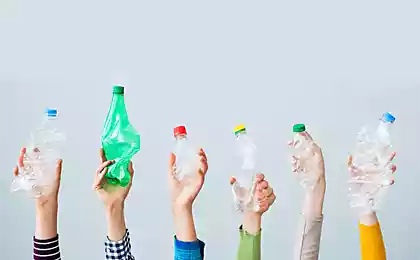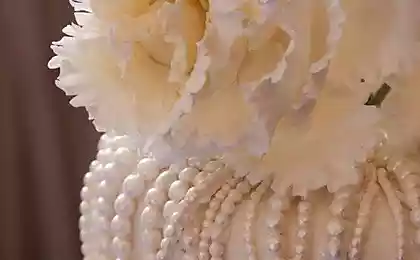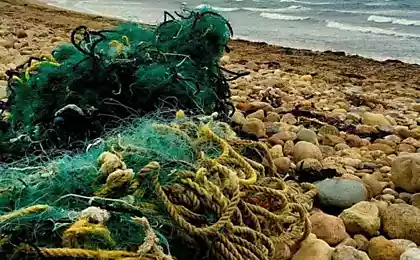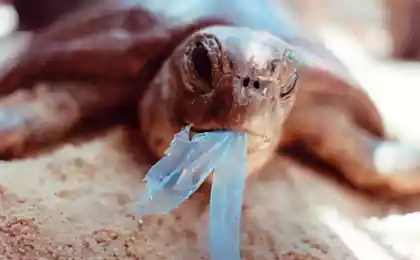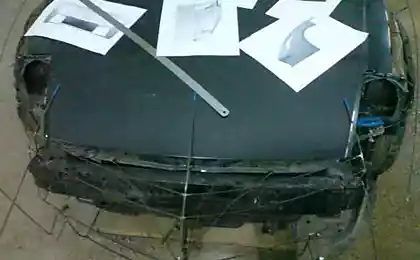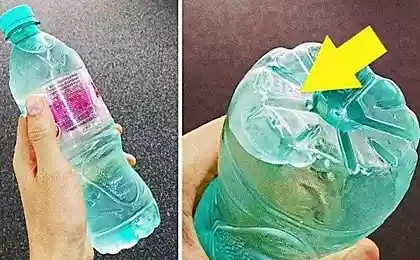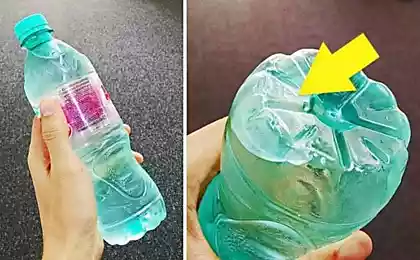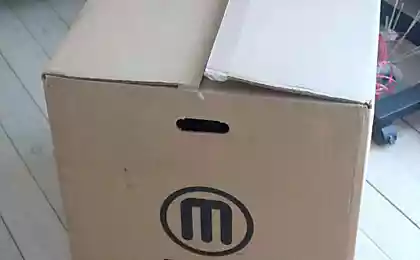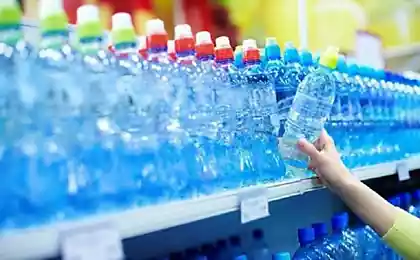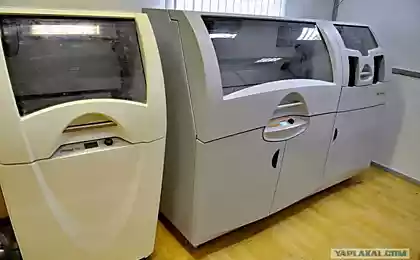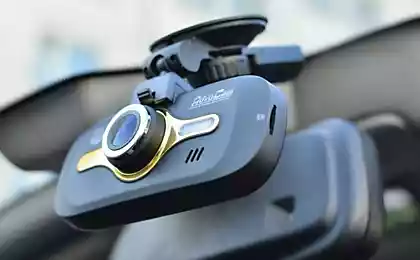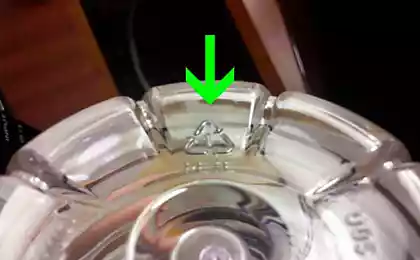604
The truth about plastic we eat
Called "the miracle material of the future", plastic (plastic) is perhaps the most common in the world of synthetic material. Because it makes everything from children's toys and packaging for products, and ending with microgranules, which are included in some toothpastes and facial scrubs.
Yes, plastic makes life easier. But it also has reverse, the dark side – he is causing enormous damage to the environment. I would like to believe that all the plastic ends his life on the processing factory. But in reality, only 9% of plastic is recycled or destroyed, and the remaining 91% into landfills or on the "trash Islands" in the ocean that are dangerous and harmful to marine life, including fish and birds.
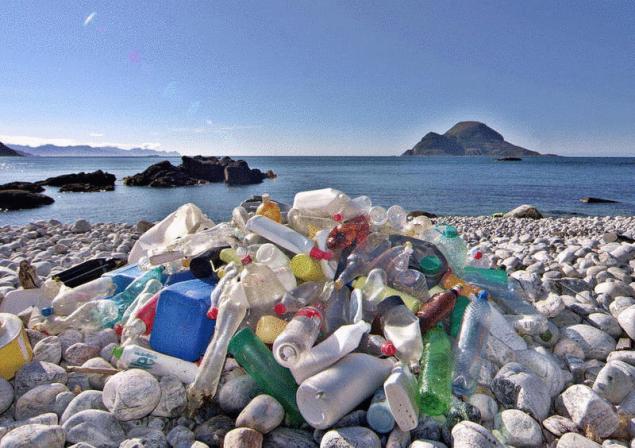
In dealing with unnecessary plastic is usually included philosophy "out of sight, out of mind" – but really, nothing doesn't just disappear, even missing from the field of our sight. On the surface of the ocean today floating around 270.000 tons of plastic waste, endangering the approximately 700 species of fish and other animals. But, unfortunately, from plastic affects not only marine animals, but including the inhabitants of the cities.
Discarded, the used plastic can "return" to our lives in a number of ways:
1. You have teeth... micro beads!
Everyone wants to have white teeth. But not everyone can afford a professional, high quality treatments for teeth whitening. And often a limited to the purchase of a special "special whitening" toothpaste, since they are inexpensive. In these products add a special plastic micro beads that are designed to mechanically scrape the coffee and tobacco stains and other defects of enamel (don't want to scare you, but these little "plastic helpers" live and in some facial scrubs!). Why do manufacturers of toothpaste decided to add a little plastic in their products would be a good idea, hard to say, but dentists of your work has increased: they often get patients who have plastic huddled in the gingival grooves (the space between the gingival and the tooth surface). Specialists in dental hygiene also suspect that the use of such micro granules causes an increased growth of bacteria. In addition, plastic is made from petroleum products, can not be healthy if it sat down somewhere within your body.
2. Consume fish? It is also plastic.
Spandex, polyester and nylon materials, widely used in the production of modern synthetic clothing, consist of plastic fibers. These fabrics are good that stretch and crease-resistant, but cause severe environmental pollution. The fact that every time you wash clothes made of such a material, about 1900 synthetic fibres washed out of each garment! Maybe you even noticed that old sports wear over time, gradually becomes thinner, it appears the holes just so. The worst part is that these fibers are too small, so don't be late industrial wastewater treatment, and sooner or later fall into the ocean.
Thus, each time erasing synthetics, you are sending sewage "mail" unhappy "package" then you will get fish, sea birds and other sea creatures that absorb synthetic fibers with water or the flesh of other marine inhabitants. In the end, plastic is securely deposited in the muscles and fat of ocean life, including fish. It's estimated that about every third piece of wild-caught sea fish, which you put in your mouth, contains plastic fibers. What to say...Bon appetite.
3. I'll have a pint of plastic, please!
Plastic deposited in the teeth, will not increase the mood. Plastic in fish can completely fight off her hunting. But the plastic is contained in... the beer is generally below the belt! A recent study by German scientists has proven that some of the most popular German Beers contains microscopic fibers of plastic. In fact, historically, German beer is famous for its natural, and still was considered that due to traditional recipes and strict quality control, it is 'guaranteed' contains only 4 natural ingredients: water, barley malt, yeast and hops. But the meticulous German scientists have discovered the different varieties of the popular beer to 78 plastic fibers per liter is a kind of unwanted "fifth element"! Despite the fact that Breweries usually use filtered water, microfiber, plastic, can leak even through a complex system of purification...
Such here the unpleasant surprise that not only spoil the Oktoberfest, but in General forced to give up beer. By the way, in other countries, such studies have not yet been conducted, but the guarantee of safety is, of course, does not!
Unfortunately, teetotalers are not immune from this danger: fiber plastic, although in much smaller quantities, was discovered by the vigilant German researchers and mineral water, and even in ... the air.
What to do?
To clean the environment from the already trapped microfibers and micro granules of plastic, unfortunately, is impossible. But it is possible to eliminate the production and consumption of harmful containing plastic products. What we want to do? Carefully consider the choice of goods and "money" to vote for green. By the way, Western vegetarians do use a special mobile app, Beat the Bead, which often allows you to by scanning the code strip to determine whether the product contains plastic micro beads.
The above-described ways in which "returns" the plastic is, alas, not the only possible, therefore, in General, it is better to limit the consumption and use of plastic and other synthetic packaging to keep and the health of the planet, and your own. published
P. S. And remember, only by changing their consumption — together we change the world! ©
Source: vegetarian.ru/articles/inogda-oni-vozvrashchayutsya-zhutkie-fakty-o-plastike-kotoryy-my-edim.html
Yes, plastic makes life easier. But it also has reverse, the dark side – he is causing enormous damage to the environment. I would like to believe that all the plastic ends his life on the processing factory. But in reality, only 9% of plastic is recycled or destroyed, and the remaining 91% into landfills or on the "trash Islands" in the ocean that are dangerous and harmful to marine life, including fish and birds.

In dealing with unnecessary plastic is usually included philosophy "out of sight, out of mind" – but really, nothing doesn't just disappear, even missing from the field of our sight. On the surface of the ocean today floating around 270.000 tons of plastic waste, endangering the approximately 700 species of fish and other animals. But, unfortunately, from plastic affects not only marine animals, but including the inhabitants of the cities.
Discarded, the used plastic can "return" to our lives in a number of ways:
1. You have teeth... micro beads!
Everyone wants to have white teeth. But not everyone can afford a professional, high quality treatments for teeth whitening. And often a limited to the purchase of a special "special whitening" toothpaste, since they are inexpensive. In these products add a special plastic micro beads that are designed to mechanically scrape the coffee and tobacco stains and other defects of enamel (don't want to scare you, but these little "plastic helpers" live and in some facial scrubs!). Why do manufacturers of toothpaste decided to add a little plastic in their products would be a good idea, hard to say, but dentists of your work has increased: they often get patients who have plastic huddled in the gingival grooves (the space between the gingival and the tooth surface). Specialists in dental hygiene also suspect that the use of such micro granules causes an increased growth of bacteria. In addition, plastic is made from petroleum products, can not be healthy if it sat down somewhere within your body.
2. Consume fish? It is also plastic.
Spandex, polyester and nylon materials, widely used in the production of modern synthetic clothing, consist of plastic fibers. These fabrics are good that stretch and crease-resistant, but cause severe environmental pollution. The fact that every time you wash clothes made of such a material, about 1900 synthetic fibres washed out of each garment! Maybe you even noticed that old sports wear over time, gradually becomes thinner, it appears the holes just so. The worst part is that these fibers are too small, so don't be late industrial wastewater treatment, and sooner or later fall into the ocean.
Thus, each time erasing synthetics, you are sending sewage "mail" unhappy "package" then you will get fish, sea birds and other sea creatures that absorb synthetic fibers with water or the flesh of other marine inhabitants. In the end, plastic is securely deposited in the muscles and fat of ocean life, including fish. It's estimated that about every third piece of wild-caught sea fish, which you put in your mouth, contains plastic fibers. What to say...Bon appetite.
3. I'll have a pint of plastic, please!
Plastic deposited in the teeth, will not increase the mood. Plastic in fish can completely fight off her hunting. But the plastic is contained in... the beer is generally below the belt! A recent study by German scientists has proven that some of the most popular German Beers contains microscopic fibers of plastic. In fact, historically, German beer is famous for its natural, and still was considered that due to traditional recipes and strict quality control, it is 'guaranteed' contains only 4 natural ingredients: water, barley malt, yeast and hops. But the meticulous German scientists have discovered the different varieties of the popular beer to 78 plastic fibers per liter is a kind of unwanted "fifth element"! Despite the fact that Breweries usually use filtered water, microfiber, plastic, can leak even through a complex system of purification...
Such here the unpleasant surprise that not only spoil the Oktoberfest, but in General forced to give up beer. By the way, in other countries, such studies have not yet been conducted, but the guarantee of safety is, of course, does not!
Unfortunately, teetotalers are not immune from this danger: fiber plastic, although in much smaller quantities, was discovered by the vigilant German researchers and mineral water, and even in ... the air.
What to do?
To clean the environment from the already trapped microfibers and micro granules of plastic, unfortunately, is impossible. But it is possible to eliminate the production and consumption of harmful containing plastic products. What we want to do? Carefully consider the choice of goods and "money" to vote for green. By the way, Western vegetarians do use a special mobile app, Beat the Bead, which often allows you to by scanning the code strip to determine whether the product contains plastic micro beads.
The above-described ways in which "returns" the plastic is, alas, not the only possible, therefore, in General, it is better to limit the consumption and use of plastic and other synthetic packaging to keep and the health of the planet, and your own. published
P. S. And remember, only by changing their consumption — together we change the world! ©
Source: vegetarian.ru/articles/inogda-oni-vozvrashchayutsya-zhutkie-fakty-o-plastike-kotoryy-my-edim.html




